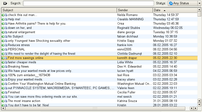
Image via Wikipedia
There have been predictions that email is dead. These are too dramatic. Technologies don’t die, they find a place at the table, but the message is legitimate when taken with a grain of salt. People are getting too many emails that aren’t targeted well enough, and it’s leading to desensitization and avoidance. Michigan State University is considering phasing out email among students because they aren’t using it. Instead, they are using social networks, texting, and instant messaging. In one study, 94% of the MSU students had Facebook accounts.
A recent report about how non-profits communicate shows the trends that many of us are probably seeing pretty clearly ourselves — too many messages and a declining engagement with them among recipients. Open rates, click-through rates, and frequency of use are all down. My own organization has done surveys in this area, and blogged about the results.
So, where are these people moving to? Social networks, where they have relevant communications, a smaller field of trusted sources, more control, and protection from spam.
For publishers, this has major implications, since many of our business models rely on being able to reliably communicate content awareness to readers and subscribers. (We’ve recently created Facebook applications here at NEJM for that very reason.)
One thing that social networks don’t do well yet is reward content providers with flexibility around advertising (the social networks run the ads) or any way to commercialize premium services. If users are moving into more relevant, protected zones, publishers and information providers will have to find ways to be there in a financially sustainable way.
![Reblog this post [with Zemanta]](http://img.zemanta.com/reblog_e.png?x-id=f97f8ee1-b253-4c4e-ad84-97808f239331)


